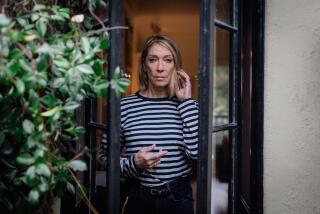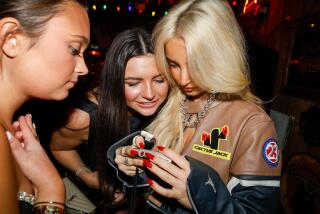Childhood joys, found too late
- Share via
WRITING a memoir of childhood -- especially about a relatively prosaic one -- can be a dicey proposition. An author asks readers to take time from their own unfolding-this-very-moment lives to immerse themselves in a remembered one. To make this investment worthwhile, readers require specific things: a compelling story, intimate insight into a distinctive experience, a reminder of the rawness of being young, or a depth of understanding about the nuances of childhood told with rigorous honesty. Paired with powerful storytelling skills, these insights can make for a great work. But without them, memoirs risk becoming self-indulgent, whiny or simply boring.
The problems weighing down Emily Fox Gordon’s “Are You Happy?” -- a memoir of a young girl’s early years in the 1950s as the daughter of an emotionally distant economics professor at Williams College in Massachusetts and an oftentimes doting, occasionally oblivious mother -- begin with the book’s question mark of a title.
“For years I kept my parents’ offenses against me inscribed in my heart,” Gordon writes in the first chapter, making her own response to the question of the book’s title abundantly clear. “Mostly it was my mother I blamed. In the unfair way of such things I was inclined to let my father off the hook, if only because I loved him less.” When a reader hasn’t yet been seduced by the narrative voice or lured in by the specifics of a story, such bald reproach is off-putting. “With encouragement from therapists, I tried several times to work my anger up to a transformative pitch, but I was never able to achieve a satisfying catharsis,” she writes. In response, we can’t summon up enough empathy to care.
“I was a vulnerable child, more sinned against than sinning,” Gordon confides. Please. The sins of her parents as she describes them are venial, no worse than even the best-intentioned parent would make.
By the book’s end, it becomes clear that the author’s goal is to show us that she really was happy but can only appreciate that happiness in hindsight. The first third of the book is so freighted with the vocabulary of melancholy and parental blame that it’s difficult to feel either sympathy or interest in the narrator’s memories, or to come around to her revised perception of her own happiness. (We know that her young adulthood won’t be happy given that her previous book, “Mockingbird Years,” which she refers to in this text, recounts her institutionalization for and longtime encounter with psychotherapeutic treatment.)
Perhaps this book’s title and its focus on individual happiness is the crux of the issue. In the long run, one wonders, what role does happiness (or, in Gordon’s case, her misperception of her own unhappiness) play in shaping a life? Looking back on childhood, these meaty questions are bigger than “was I happy?”
Was I curious? Involved in life? Wanting to learn and interact and be engaged? Did I leap from bed in the morning, excited about the adventures a new day would bring? These queries, which Gordon’s text might answer in the affirmative, if only after the fact, seem more indicative of how a young life is shaped than the navel-gazing “was I happy?” question on which much of the book focuses. After all, as humans, we’re not the best judges of what will make us happy.
Gordon offers us weighty insights as to how childhood perceptions shape us, but only in passing and too far along in the narrative. She writes lyrically and convincingly about the subtle joys of childhood in the second half of the book, showing us how our awareness dilates with age as we gain objectivity on our own lives. The writing in those moments is compelling and pristine. But alas, those instances come too late. Only hearty readers who insist on finishing books will get far enough to appreciate this memoir’s erratic moments of grace, buried as they are under the preceding pages of psychobabble and self-pity.
Bernadette Murphy is a regular contributor to Book Review and co-author, with Michelle Huneven, of “The Tao Gals’ Guide to Real Estate.”
More to Read
Sign up for our Book Club newsletter
Get the latest news, events and more from the Los Angeles Times Book Club, and help us get L.A. reading and talking.
You may occasionally receive promotional content from the Los Angeles Times.










